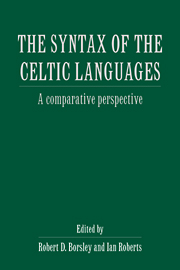Book contents
- Frontmatter
- Contents
- List of contributors
- Introduction
- 1 Long head movement in Breton
- 2 Some syntactic effects of suppletion in the Celtic copulas
- 3 Fronting constructions in Welsh
- 4 Bod in the present tense and in other tenses
- 5 Pronominal enclisis in VSO languages
- 6 Aspect, agreement and measure phrases in Scottish Gaelic
- 7 A minimalist approach to some problems of Irish word order
- 8 Subjects and subject positions in Irish
- 9 Negation in Irish and the representation of monotone decreasing quantifiers
- 10 On structural invariance and lexical diversity in VSO languages: arguments from Irish noun phrases
- References
- Index
7 - A minimalist approach to some problems of Irish word order
Published online by Cambridge University Press: 18 December 2009
- Frontmatter
- Contents
- List of contributors
- Introduction
- 1 Long head movement in Breton
- 2 Some syntactic effects of suppletion in the Celtic copulas
- 3 Fronting constructions in Welsh
- 4 Bod in the present tense and in other tenses
- 5 Pronominal enclisis in VSO languages
- 6 Aspect, agreement and measure phrases in Scottish Gaelic
- 7 A minimalist approach to some problems of Irish word order
- 8 Subjects and subject positions in Irish
- 9 Negation in Irish and the representation of monotone decreasing quantifiers
- 10 On structural invariance and lexical diversity in VSO languages: arguments from Irish noun phrases
- References
- Index
Summary
Introduction
Recent work in the principles-and-parameters approach to syntactic theory has been concerned with the range of word order variation in the world's languages. It is a tenet of this approach that such variation can be derived from a highly constrained set of simple parameters, interacting with universal principles of natural language. We would like to investigate here how the facts of Irish word order may best be represented within the framework argued for in Chomsky and Lasnik (1993) and Chomsky (1993), and discussed in Marantz (1995). The first section will provide a brief overview of the relevant notions and mechanisms of this framework and the analysis we propose. After this, we will turn to the relevant Irish data, moving on to a discussion of the predictions of our analysis and potential problems it raises. In the final section, we will provide a more detailed refinement of our initial analysis, discussing its import for a feature-driven theory of syntactic variation as in Chomsky (1993).
The framework and an initial analysis
Over the last half-decade, much work in syntax has been devoted to motivating and supporting the claim that all arguments of a verb, and in particular the subject, are base-generated within the maximal projection (VP) of that verb (i.e. the VP-internal subject hypothesis of Fukui and Speas (1986), Kitagawa (1986), Koopman and Sportiche (1991) among many others). This approach entails that in a language such as English, the subject must raise to somewhere within the maximal projection of an Inflectional category to receive abstract nominative Case.
- Type
- Chapter
- Information
- The Syntax of the Celtic LanguagesA Comparative Perspective, pp. 223 - 240Publisher: Cambridge University PressPrint publication year: 1996
- 16
- Cited by



